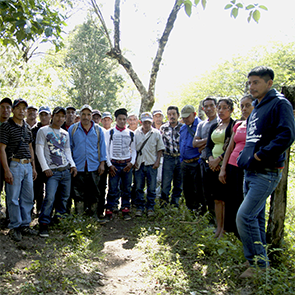Peaceful Resistance of the Microregion of Ixquisis members attacked, kidnapped and tortured
Since the “Agreement for Peace and Development” (Acuerdo para la Paz y el Desarrollo) was signed in November 2018 by the hydroelectric company Energía y Renovación and national and local authorities, members of the Resistencia Pacífica de la Microregión de Ixquisis (Peaceful Resistance of the Microregion of Ixquisis) have suffered a new wave of attacks, harassment and intimidation. The Peaceful Resistance of the Microregion of Ixquisis was the 2018 regional winner of the Front Line Defenders Award for Human Rights Defenders at Risk, and was formed in response to grave rights violations committed in the name of economic advancement in Guatemala.
On 9 December 2018, human rights defender and president of the Ixquisis Microrregional Second-Level Development Council Lucas Jorge was physically attacked. On 16 December, Ixquisis members and human rights defenders Nery Esteban Pedro and Domingo Esteban Pedro were killed in what local human rights defenders believe was an act of retaliation for their opposition to the hydroelectric project.
As part of the implementation of the Agreement, a military contingent of around 200 army soldiers was deployed to San Mateo Ixtatán, where a number of indigenous communities are located, including Ixquisis, in the north of Huehuetenango department. The contingent arrived on 4 February 2019, supposedly to provide security for the future establishment of state-level justice bodies. On 15 February, the contingent withdrew after pressure from local groups, including the Peaceful Resistance of the Microregion of Ixquisis, whose members felt intimidated by the presence of heavily armed forces in a context of constant repression of social movements for the defence of the environment.
The Inter-American Development Bank’s Independent Mechanism of Consultation and Investigation (Mecanismo Independiente de Consulta e Investigación, MICI) visited the municipality of San Mateo Ixatán on 23 January 2019. The visit was in response to a complaint, which had been filed by the Peaceful Resistance of the Microregion of Ixquisis, against the hydroelectric project in August 2018. The MICI delegation met with representatives of the communities and gathered their testimonies regarding the hydroelectric project’s environmental and social impacts on human rights, with a special concern for the lack of previous consultation and violence that arose from the implementation of the hydro-electric project. On 31 January, MICI published a resolution in which it declared that it was taking the complaint forward.
After the visit of MICI, on 22 February 2019, the Chuj indigenous nation’s delegate before the Plurinational Ancestral Government “Payxail Yajaw Konob’” (Gobierno Ancestral Plurinacional “Payxail Yajaw Konob’”) and public ally of the Peaceful Resistance of the Microregion of Ixquisis Julio Gómez Lucas and six of his family members were kidnapped and tortured by residents of the neighbouring indigenous community of Tz’ununkab. Julio Gómez Lucas was falsely accused of illegal trafficking of wood, beaten and dragged by the Tz’ununkab authorities to a community centre, where he was tortured and subjected to ill-treatment for an eight-hour period. Local residents were called to gather in the centre and witness the public punishment.
In the community centre, the accusations against Julio Gómez Lucas shifted and now related to the role played by the Peaceful Resistance of the Microregion of Ixquisis in the halting of the construction of hydroelectric dams by Energía y Renovación in the municipality; the removal of military forces from the area; non-compliance with the Agreement; and the lack of implementation of infrastructure projects by the San Mateo Ixtatán municipality.
When the human rights defender’s wife, María Felipe Gómez y Gómez, was called to visit her husband, she and five family members that accompanied her were also kidnapped and tortured for a period of around five hours. The community members of Tz’ununkab who had detained them asked for the sum of Q 150,000.00 (approximately EUR 17,200) for the release of Julio Gómez Lucas, claiming that otherwise he would be burned alive. A cousin of María Felipe Gómez y Gómez, was subjected to sexual violence for allegedly trying to film the scene, even though no recording equipment was found on her when she was searched. After realising that the family could not pay more than the Q 60,000 (approximately EUR 6,900) they had already given, the group released them and threatened to kidnap and kill the human rights defender and his family members if they revealed what had happened to them.
The kidnapping of Julio Gómez Lucas and his family members, as well as previous attacks and killings of members of the Resistencia Pacífica de la Microregión de Ixquisis who had been defending the rights of their community, highlights the pattern of violence in the municipality of San Mateo Ixtatán that Front Line Defenders has been documenting since July 2018. The level of violence in the region has been growing substantially, and Front Line Defenders reiterates its calls on the local and national authorities to provide the human rights defenders of the Resistencia Pacífica de la Microregión de Ixquisis with adequate protection and ensure their physical and psychological integrity.
Front Line Defenders strongly condemns the killings of members of the Peaceful Resistance of the Microregion of Ixquisis. Front Line Defenders expresses its concern over the State’s lack of appropriate responses to the kidnapping and torture of Julio Gómez Lucas and his family members, and urges the Guatemalan authorities to immediately carry out a full and transparent investigation into these violent incidents.
Front Line Defenders also notes with concern that the implementation of the hydro-electric megaproject has significantly contributed to an increase in the level of inter-group tensions, and that policies put in place by the hydroelectric company and local authorities have fomented animosity and polarization among the different indigenous groups in the region. Front Line Defenders strongly believes that these problems are exacerbated by a failure to ensure indigenous peoples’ rights to free, prior and informed consent over projects that affect them, as outlined in the United Nations Declaration on the Rights of Indigenous Peoples

